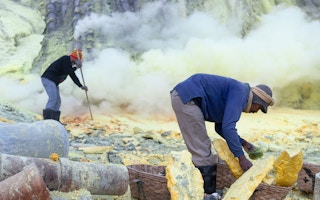Indonesia has been claimed by many scientists as one of the most ecologically diverse countries on this planet.
Although representing less than two per cent of the global landmass, Indonesia is blessed with thousands of species of animals and plants. Despite the significant biological diversity in Indonesia, the unfortunate loss of biodiversity has continued to increase and is currently in a critical condition. One of the major drivers of biodiversity loss has been identified as continued habitat loss, due to the large-scale conversion of habitat areas to plantations, mines, and the broad overexploitation of natural resources.
All this is actually known to many people, and this topic has not only been discussed in many national and international conferences, but also been a major concern among academia, scientists and civil society organizations (CSO) in Indonesia. However, this issue has never been a serious concern to the government. For example, biodiversity conservation is rarely taken into account in development planning. This issue is also not a priority among parliamentarians during legislation. The important question now is, will this issue be prioritized by the administration of the new president? The answer depends on the people you ask, but the fact remains that Indonesia is still facing serious problems with the management of its rich biodiversity.
“
While the national economy is growing, most of the contribution to Indonesia’s economy comes from the consumption and export of non-value-added natural resources
While Indonesia is a center of biodiversity, and biodiversity is an essential source of human existence on the planet, it is unfortunate that a significant amount of the Indonesian community including bureaucrats, the private sector, and the community at large are not well aware of this. This fact is reflected through the attitude of the government in running the development program. While the national economy is growing, most of the contribution to Indonesia’s economy comes from the consumption and export of non-value-added natural resources. Currently, large-scale habitat conversion is continuing, especially in the logging sector, where forest fires have become a routine issue in this country.
This complex issue obviously cannot be solved overnight. However, if we want to survive on this planet, we certainly need a massive change. Indonesia, though significant for its biodiversity, is one of the most insecure countries in the world due to the global climate change phenomenon. Geographically, we are very vulnerable to natural disasters, which may have a serious impact on food security, economic stability and the country’s integrity. Therefore, we have no other option but to manage our natural resources in a sustainable manner and preserve our rich biodiversity.
So where do we start? I am very much interested in the “mental revolution” idea mooted by one of the presidential candidates. I don’t know him personally and have no affiliation with him or with any of his coalition parties, but I think his idea is important to save the country from socio-ecological disasters in the near future.
In the context of biodiversity conservation, “mental revolution” can be interpreted in at least three ways. First, I interpret it to mean the perspective of managing natural resources in a sustainable way. In the decentralization era, the local government has extensive autonomy to manage natural resources. As the political cost is expensive it is very common for the elected local government leaders to expect to get instant economic returns through short-term natural exploitation, such as the issuance of mining concessions and large-scale plantation concessions, without considering the environmental damage that might occur.
In this context, I think “mental revolution” is critically needed to change the attitude of the local government and make them exploit their natural resources not for short-term benefits, but instead for sustainable benefits. Furthermore, all natural resources such as; mining, timber and agricultural products need to be processed first prior to export to give significant added value to the country.
Second, “mental revolution” is interpreted to mean changing the ways of the business community in the operation of their business practices. As we are all aware, large-scale mining companies, oil palm plantations, and pulp and paper companies have been heavily criticized for their environmentally unfriendly business practices. As they manage millions of hectares of lowland rainforest considered to be the most important biodiversity habitat on Earth, they play a significant role in protecting our biodiversity. Changing business community practices to be more sustainable, such as by protecting high-conservation-value concession areas, and developing low-carbon production strategies and socially sensitive business models will have a significant impact on preserving biodiversity over the long term.
“
I think “mental revolution” is critically needed to change the attitude of the local government and make them exploit their natural resources not for short-term benefits, but instead for sustainable benefits
Third, I believe a “mental revolution” is critically important in every aspect of the governance process. This calls for transparent, accountable and responsible government bureaucracy and policy development to ensure an inclusive socioeconomic and ecological impact.
Every single policy developed and implemented needs to be free from the vested interests of political parties and individuals. In this way, we can ensure that Indonesia’s natural resources will be managed sustainably and used optimally for the prosperity of the Indonesian people.
To be able to implement the above “mental revolution” fully, the administration of the next president must have a strong commitment, good leadership and integrity. The leader should have a proven track record and the policy should not be influenced by any political agenda. In this way, the trust between the Indonesian people and the government can be improved. As we are at the “edge of tomorrow,” it is, therefore, our call to decide whether tomorrow should be better or worse than today.
Arnold Sitompul, PhD, is the program director of the KEHATI Foundation. The views expressed in this article are his own and do not necessarily reflect the official policy or views of the Foundation. This post originally appeared in The Jakarta Globe.

















